In the domain of project management, effective communication is the backbone of success. One of the most significant forms of communication during any initiative are the meetings that take place among project stakeholders. These gatherings serve to share insights, align on goals, and address challenges as they arise. However, the type and structure of these meetings can vary considerably based on the selected project management approach—be it predictive or iterative. In this article, we will explore the various types of meetings integral to both management styles, providing a comprehensive understanding of how to tailor meeting strategies to meet project needs effectively.
Meetings are not merely obligatory gatherings; they are key opportunities for collaboration, decision-making, and progress assessment. Understanding which meetings are necessary and when they should occur can significantly influence the trajectory of a project, improving both efficiency and team morale. As such, a nuanced examination of the various meeting types within predictive and iterative management styles is crucial for managers striving for operational excellence.
Project Meetings and Development Approaches
The significance of meetings in project management cannot be overstated. They are not only platforms for discussion but also mechanisms that guide the initiative towards its objectives. Each approach to managing projects—whether predictive, iterative, agile, or hybrid—influences the types of meetings that are held and their structures. A well-defined meeting framework aligns with the overarching project goals, thereby enhancing stakeholder engagement and accountability.
In predictive project management, where a clearly defined sequence of phases is laid out, meetings often follow a scheduled frequency and are structured around specific deliverables. Conversely, iterative project management thrives on flexibility, emphasizing adaptive meetings to reflect ongoing developments. By understanding how these different approaches shape meeting structures, project leaders can optimize their time and resources while ensuring that all team members are on the same page throughout the project lifecycle.

Project Meetings in Predictive Project Management
Predictive project management initiatives are typically characterized by meticulous planning and a sequential progression through distinct phases. These projects operate under a defined scope, timeline, and budget, necessitating specific types of meetings that facilitate these objectives. Each meeting type has a designated purpose and contributes uniquely to the overall initiative.
One of the foundational gatherings in predictive management is the Kick-off Meeting. This initial meeting sets the stage for the entire initiative by bringing together all stakeholders to discuss objectives, roles, responsibilities, and expectations. Following this, regular Status Meetings are essential for tracking progress against established milestones and resolving any pending issues. Furthermore, Risk Management Meetings focus on identifying, assessing, and mitigating potential risks that could derail the project, while Issue Resolution Meetings provide a forum for addressing obstacles that may impede progress.
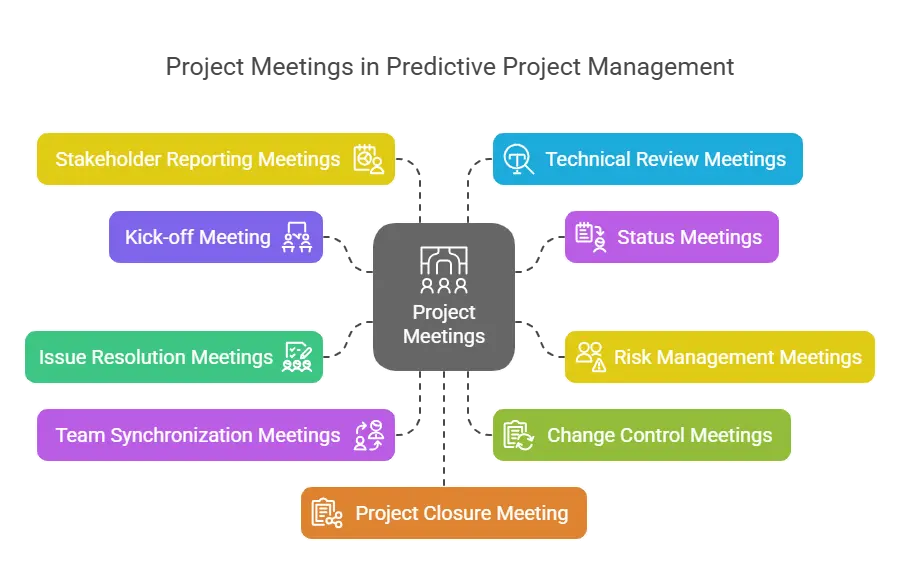
Other important meetings include Team Synchronization Meetings, which ensure all members are aligned on tasks and schedules, and Change Control Meetings, where any modifications to the project plan are discussed and approved. Moreover, Stakeholder Reporting Meetings keep external parties informed of progress, and Technical Review Meetings assess technical aspects to confirm adherence to set standards. Finally, the Project Closure Meeting evaluates the completed initiative against its original goals and compiles lessons learned.

Free Project Meeting Template
Plantilla de Reunión de Proyecto gratis
Project Meetings in Iterative Project Management
In contrast, iterative project management takes a more fluid approach, focusing on continuous improvement and adaptability through cyclic phases. Initiatives operate in incremental cycles called iterations, which necessitate a different set of meetings aimed at fostering collaboration and responsive adjustments.
The Iteration Planning Meeting is one of the cornerstones of this approach. During this gathering, team members define objectives for the upcoming iteration, allocate tasks, and establish timelines. The dynamic nature of iterative management is highlighted in the Daily Standup Meeting where brief, focused discussions take place to share updates on progress, roadblocks, and immediate goals.
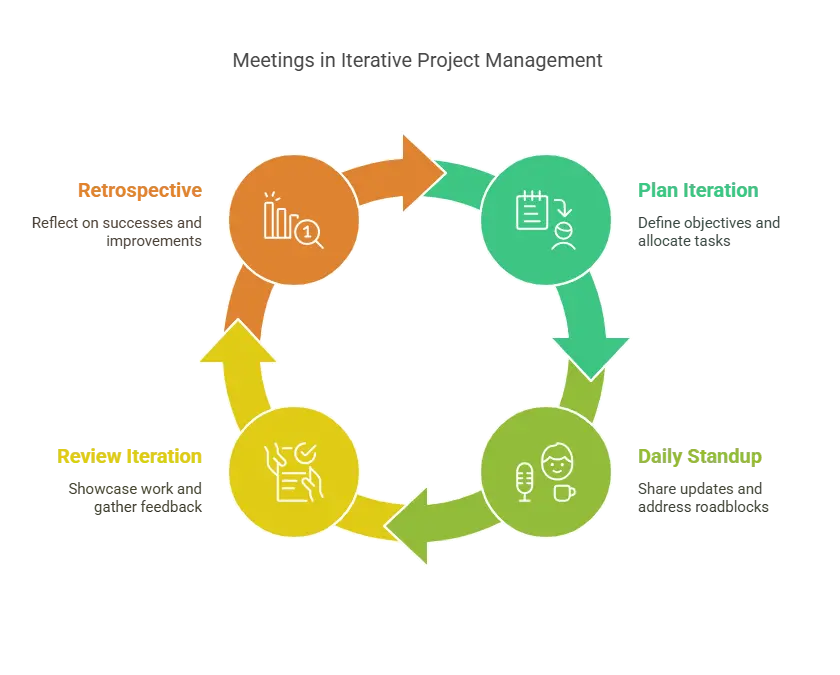
Following the completion of an iteration, the Iteration Review Meeting provides an opportunity to showcase the work completed, gather feedback, and discuss any necessary adjustments moving forward. Additionally, the Retrospective Meeting enables the team to reflect on the iteration's successes and areas for improvement, fostering a culture of continuous learning and growth.
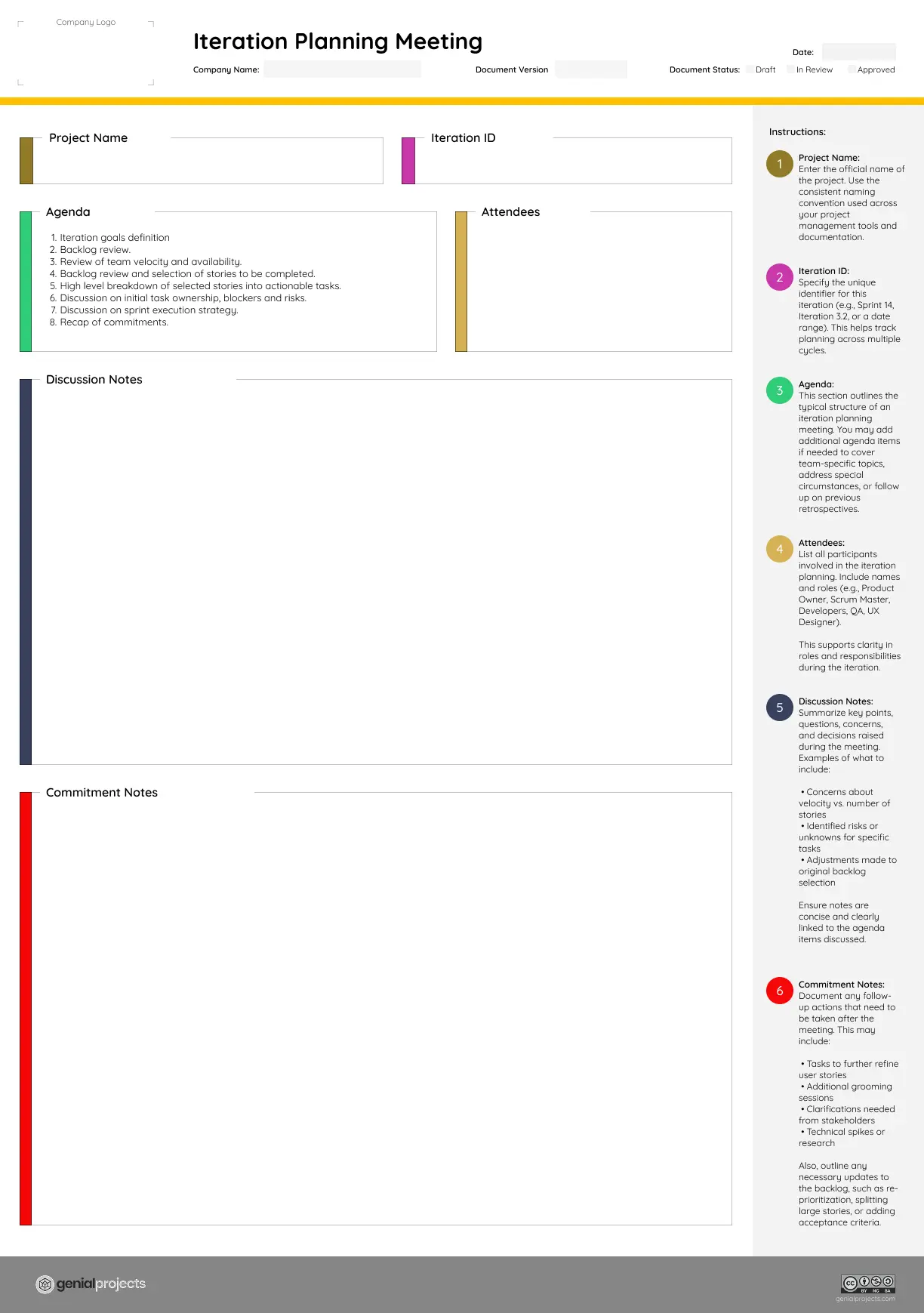
Free Iteration Planning Meeting Template
Plantilla de Reunión de Planificación de Interación gratis
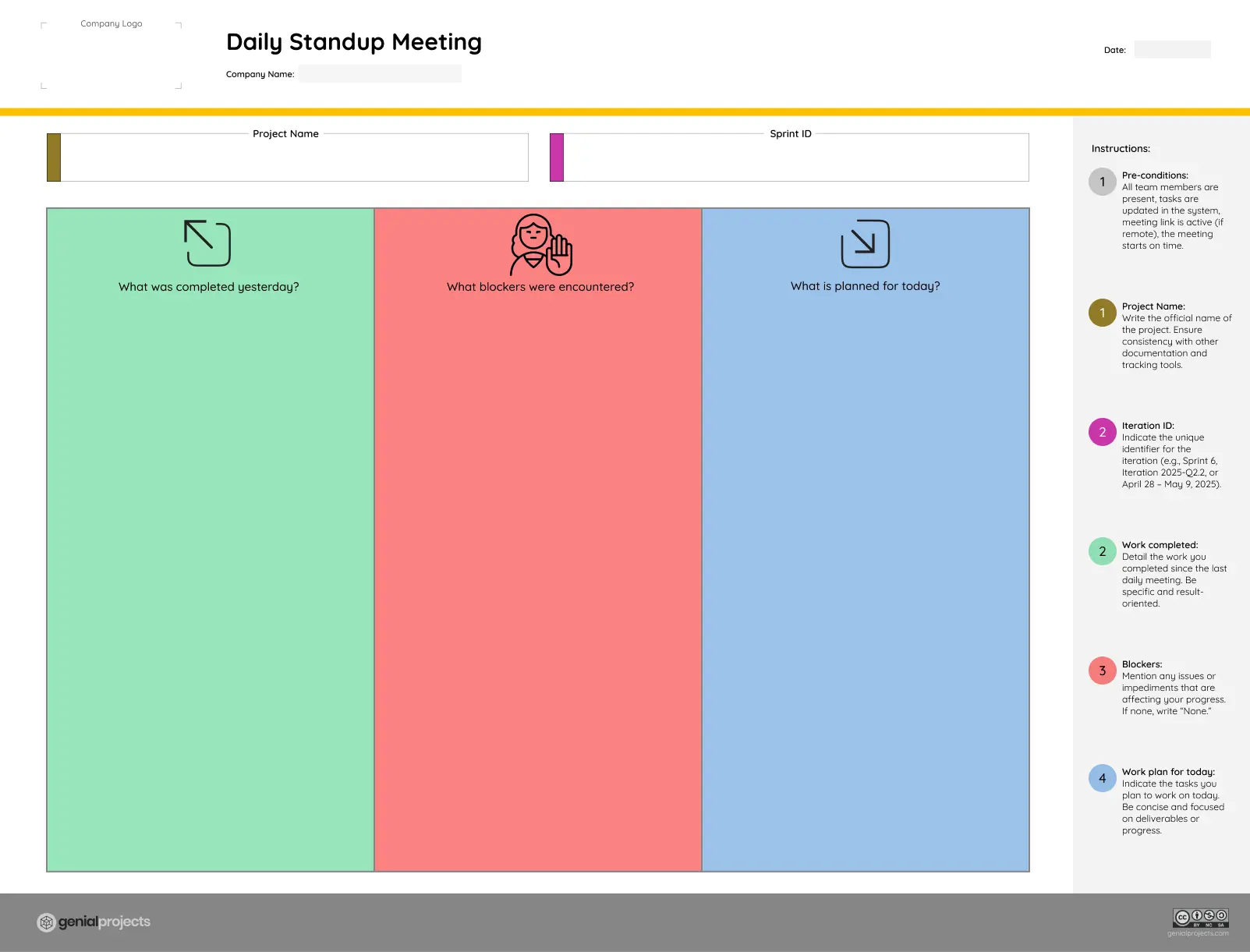
Free Daily Stand Up Meeting Template
Plantilla de Reunión Diaria gratis
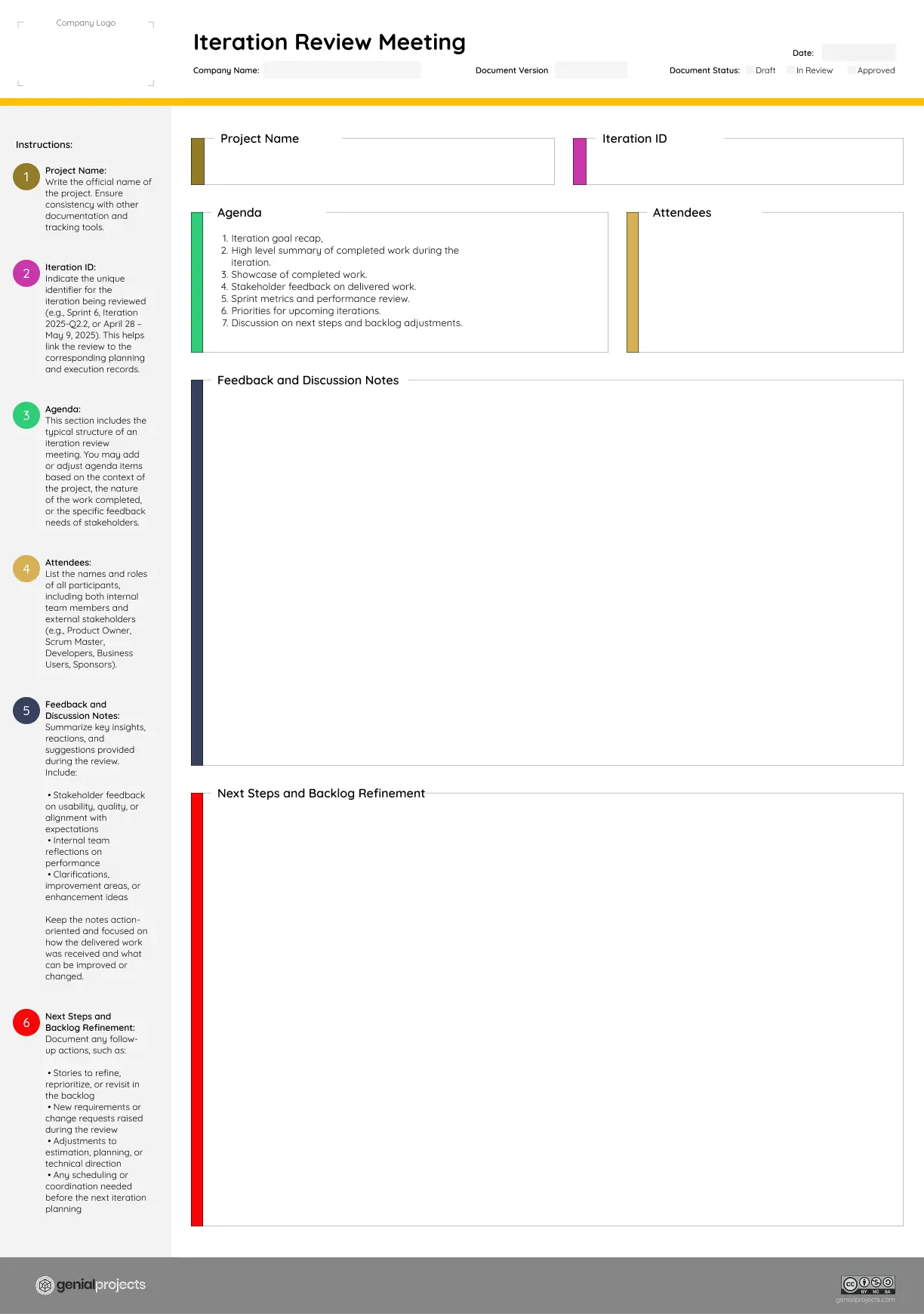
Free Iteration Review Meeting Template
Plantilla de Reunión de Revisión de Iteración
gratis
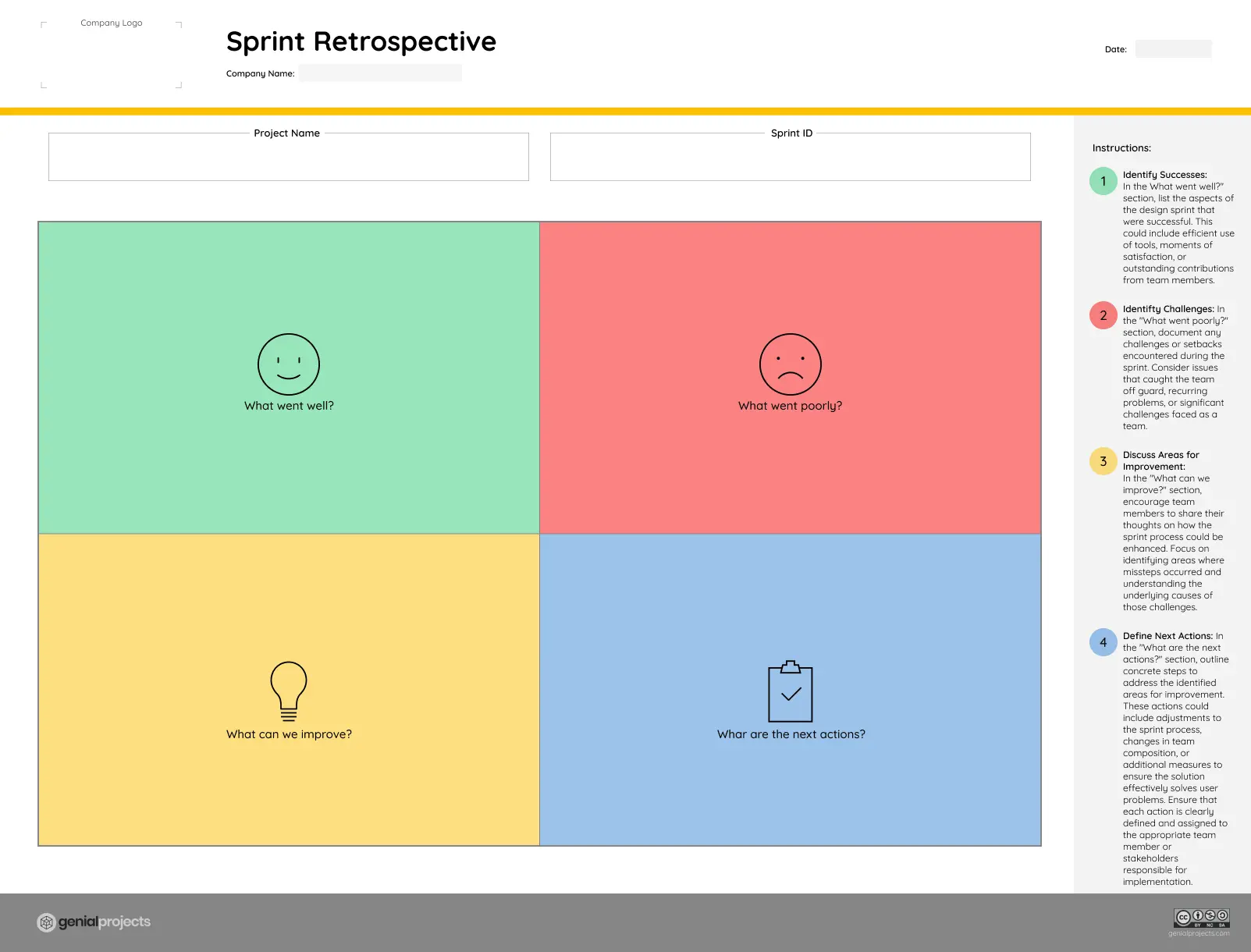
Plantilla de Retrospectiva de Sprint gratis
Free Sprint Retrospective Template
Comparing Meeting Structures
While both predictive and iterative approaches employ meetings as vital tools for communication and decision-making, notable differences exist regarding their structure, purpose, and frequency. In predictive management, meetings are generally held at predetermined intervals, often following a structured agenda that aligns with project milestones. These meetings may have formal documentation, such as minutes and action items, which create a historical record of decisions and outcomes.
In contrast, iterative management favors a more flexible and organic meeting rhythm. Meetings occur more frequently—often daily, in the case of standups—allowing teams to respond quickly to changing project dynamics. Documentation in this context may be less formal, with an emphasis on actionable dialogues and immediate problem-solving rather than exhaustive record-keeping.
Ultimately, the meeting structures in predictive and iterative management highlight how different organizational philosophies influence communication and collaboration. A tailored approach that aligns with the overall project strategy enhances the efficacy of these meetings and optimizes team performance.
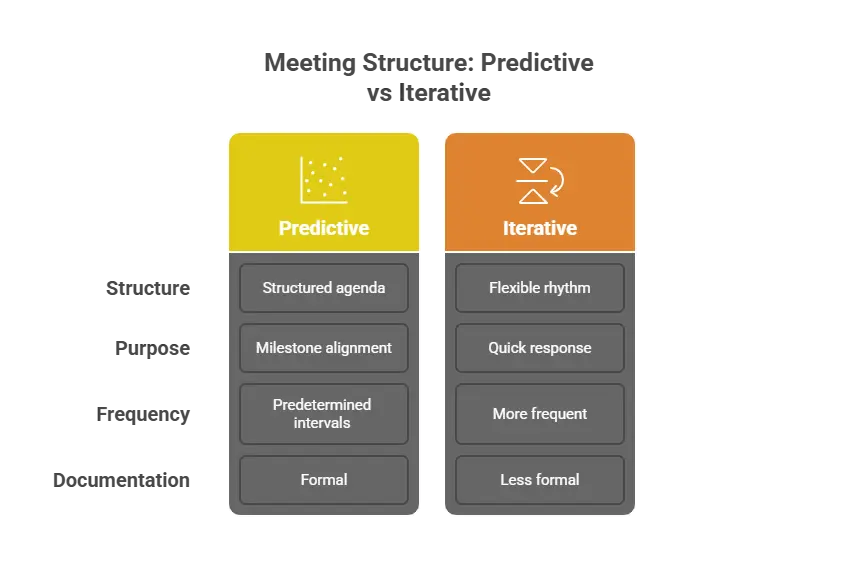
Moreover, outlining Quality Control Activities is integral to any QMP. Detailing activities such as inspections and tests allows teams to establish rigorous quality assessments that can detect issues early. Similarly, describing Quality Assurance Activities, including processes and audits, ensures that ongoing adherence to quality standards is sustained throughout the project’s lifecycle, further mitigating risks of failure.
Best Practices for Effective Project Meetings
Regardless of whether you are implementing a predictive or iterative management style, certain best practices are universal for ensuring effective project meetings. First and foremost, preparation is key. Having a well-structured agenda is essential for guiding discussions, staying on topic, and maximizing time efficiency. A disciplined approach to meeting organization helps avoid digressions and ensures that all key points are addressed.
Additionally, maintaining and distributing meeting minutes is critical for tracking decisions and assignments. These records help clarify individual responsibilities and ensure accountability. Action items should be explicitly defined, with clear owners and deadlines assigned to each task. This practice reinforces the notion that meetings are intended to achieve specific outcomes rather than merely serve as a forum for discussion.
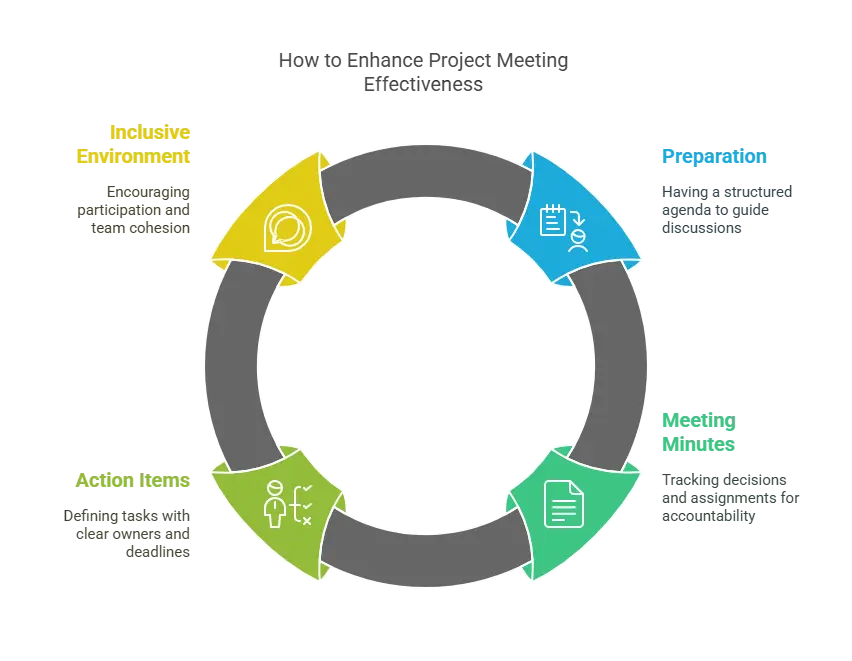
Finally, fostering an inclusive environment where all participants feel encouraged to voice their opinions can lead to richer dialogue and enhanced team cohesion. Encouraging questions and input from all stakeholders promotes ownership and investment in the initiative’s success.
Key Takeaways
In summary, mastering the domain of project meetings effectively hinges on understanding the various meeting types integral to both predictive and iterative project management. From the structured gatherings that guide a predictive initiative to the flexible, adaptive discussions that characterize an iterative approach, each meeting serves a critical function in steering projects toward their goals.
Additionally, the importance of customizing meeting strategies cannot be understated. Tailoring the frequency, structure, and objectives of meetings to align with the chosen management approach enhances engagement, mitigates risks, and drives successful project outcomes. Ultimately, effective communication through well-structured meetings is an invaluable pillar for any project manager aiming for excellence in execution.